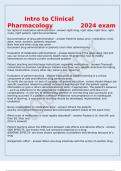Intro to Clinical
Pharmacology 2024 exam
Six rights of medication administration - answer-right drug, right dose, right time, right
route, right patient, right documentation
Documentation of drug administration - answer-Patients status prior, medication, time,
dose, route, location, patients response.
Note how and when drug was given.
Document drug administration in patients chart after administering.
Evaluation of medication administration - answer-Determine if the goals were met and
you can move on to the next priority health need. Or determine how to modify
interventions to resolve current unresolved problem
Patient teaching and discharge instructions regarding medications - answer-Thorough
instructions to promote compliance. Patient may have very specific directions for taking
these medications. (every other day, twice a day, tapering)
Evaluation of patient teaching - answer-Evaluation of patient learning is a critical
component of safe and effective drug administration.
To verify the success—or lack of success—of patient education, nurses should always ask
specific questions related to patient outcomes and request that the patient repeat
information or give a return demonstration of skills, if appropriate. The patient's behavior
—such as adherence to the schedule for medication administration with few or no
complications—is one key to determining whether or not teaching was successful and
learning occurred. If a patient's behavior evidences noncompliance or an inadequate
level of learning, a new plan of teaching should be developed, implemented, and
evaluated.
Nurse responsibility in medication error - answer-(Check the patient)
Quickly and comprehensively assess and anticipate patient needs at the same time
What route of medication is most rapidly absorbed? - answer-Fastest is IV, then IM, and
then SQ, then oral.
(Oral is slowest)
Patient teaching about the difference between side effects and adverse effects - answer-
SIDE EFFECTS- are known mild, but annoying response to a drug.
ADVERSE EFFECTS- are more severe symptoms or problems that develop because of a
drug
Antagonistic effect - answer-When one drug interferes with the action of another drug
, Synergistic effect - answer-Combined effect of two medications together is greater than
the effect of the medications given separately
Incompatibility - answer-When drugs do not mix well chemically
Drug interaction - answer-One drug may interfere with the absorption of another, the
distribution of another, decrease or increase the other drug's metabolism, or prohibit
elimination of the other drug.
Additive effect - answer-Sum of the effects of two drugs.
teratogenic effect - answer-Drugs that have a potential, or those likely to cause
malformations or damage in the embryo or fetus;
Patient teaching about antibiotics - answer-Teach patient and family
*Eat plain crackers with medicine if GI upset occurs
*Take medication as prescribed even if symptoms disappear.
*Unused medication should not be saved(potency decreases as the get older)
*Check for infection in mouth, anal, or vaginal areas (may be related to a superinfection)
*Report diarrhea that last over 24hrs or any blood or mucus in stool
*Liquid medication should be kept in dark colored light-resistant container
*Antibiotics can change the results of urine glucose test
*Bone marrow depression after therapy can occur and should report any bruising,
petechiae, sore throat, or weakness
*Allergies can develop as well as rash, hives, decreased urination, diarrhea, or other
unusual symptoms.
*Call 911 if shortness of breath or difficulty breathing develops
Patient teaching regarding oral contraceptive pill (OCP)
*Related to STI - answer-Do not reduce the risk of getting a sexually transmitted disease.
Their use has cut both the birth and abortion rate
Pregnancy, diet, and nutrition
*Fetal neural tube defects, vitamin supplement recommended is? - answer-Eating foods
high in folate (citrus fruits, cereals, leafy greens, and whole grains) or taking a
multivitamin that has folic acid to protect against neural tube birth defects such as spina
bifida and anencephaly. Vitamin B9 (folic acid).
HRT (hormone replacement therapy)
*Increased risk for - answer-Increases the risks of heart attack, strokes, and breast
cancer in some women
HRT (hormone replacement therapy)
*Nursing intervention - answer-Monitor closely for cardiovascular problems
Glucosamine is an herbal product used to help - answer-Osteoarthritis and rheumatoid
arthritis




